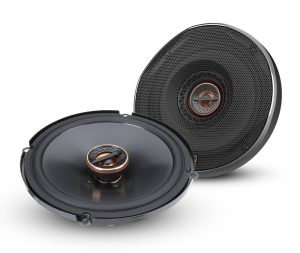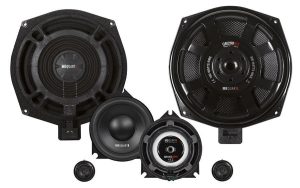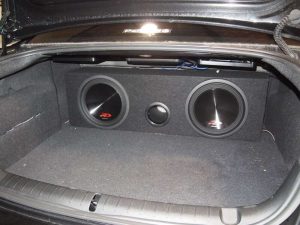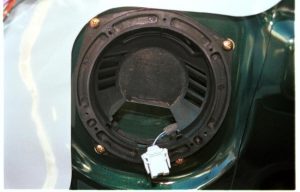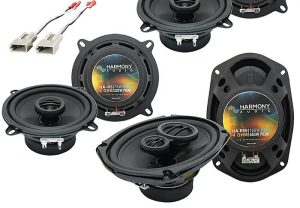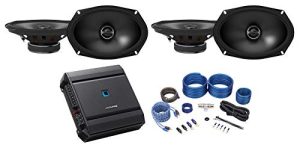Upgrading your car’s audio system transforms every drive into a concert-like experience. Crisp highs, deep bass, and clear vocals make your favorite tunes come alive. But one question stops many enthusiasts in their tracks: What speakers fit my car? Choosing the right car speakers involves understanding your vehicle’s specifications, speaker types, and key performance factors like size, power handling, and sound quality. This guide breaks it all down, helping you select the perfect speakers for your ride while keeping the process simple and stress-free. Let’s dive in and explore how to elevate your car audio game.
Contents
- Why Upgrade Your Car Speakers?
- Step 1: Know Your Car’s Speaker Size
- Step 2: Understand Speaker Types
- Step 3: Consider Key Speaker Specifications
- Step 4: Check Vehicle Compatibility
- Step 5: Plan Your Installation
- Step 6: Choose the Right Speakers for Your Budget
- Step 7: Enhance Your System with Accessories
- Top Speaker Recommendations for 2025
- Final Thoughts
Why Upgrade Your Car Speakers?
Factory-installed speakers often fall short in delivering rich, immersive sound. They prioritize cost over quality, leaving you with flat audio that lacks depth. Upgrading your speakers breathes new life into your music, podcasts, or audiobooks. Here’s why you should consider swapping out those stock speakers:
- Enhanced Sound Quality: Aftermarket speakers produce clearer vocals, sharper highs, and punchier bass, creating a balanced audio experience.
- Better Durability: Premium speakers use high-quality materials, ensuring they last longer even with heavy use.
- Customizable Sound: You can tailor the audio to your preferences, whether you love bass-heavy hip-hop or crystal-clear classical music.
- Increased Volume Without Distortion: Upgraded speakers handle higher power outputs, letting you crank up the volume without crackling or buzzing.
Now that you know why upgrading matters, let’s tackle the main question: how do you find speakers that fit your car?
Step 1: Know Your Car’s Speaker Size
The first step in finding the right speakers is determining the size of your car’s existing speaker slots. Simplify: ‘Car speakers come in various standard sizes, including 3.5, 4, 5.25, 6.5, and 6×9 inches.’ Installing speakers that match these dimensions ensures a seamless fit without major modifications.
How to Check Speaker Size
You don’t need to be a mechanic to figure out your car’s speaker size. Here are a few easy ways to get the information:
- Check the Owner’s Manual: Your car’s manual often lists the factory speaker sizes for locations like the doors, dashboard, or rear deck.
- Measure Existing Speakers: Remove the speaker grille (usually with a screwdriver) and measure the diameter of the speaker cone. Don’t forget to check the mounting depth, as some aftermarket speakers have larger magnets that may not fit shallow spaces.
- Use Online Fit Guides: Websites like Crutchfield, Sonic Electronix, or OnlineCarStereo.com offer vehicle fit guides. Enter your car’s make, model, and year to get a list of compatible speaker sizes. These tools also recommend specific speaker models, saving you time.
- Consult a Professional: If you’re unsure, visit a car audio shop. Experts can quickly identify the right size and suggest high-quality options.
Common speaker sizes vary by vehicle type. For example, compact cars like a Honda Civic often have 6.5-inch speakers in the doors, while larger vehicles like a Toyota RAV4 might use 6×9-inch speakers in the rear deck. Always double-check your car’s specs to avoid buying mismatched speakers.
Step 2: Understand Speaker Types
Car speakers come in two primary types: coaxial and component. Each offers distinct advantages, so your choice depends on your budget, audio goals, and installation preferences. Let’s break them down.
Coaxial Speakers (Full-Range Speakers)
Coaxial speakers combine a woofer (for low frequencies) and a tweeter (for high frequencies) into a single unit. They’re the most common type of car speaker due to their affordability and ease of installation.
- Pros:
- Easy to install, often fitting directly into factory speaker slots.
- Budget-friendly, with quality options starting around $50 per pair.
- Deliver decent sound for casual listeners.
- Cons:
- Limited sound customization compared to component speakers.
- Sound quality may not satisfy audiophiles seeking premium audio.
- Best For: Drivers looking for a simple, cost-effective upgrade without complex wiring or modifications.
Popular coaxial speaker brands include JBL, Kenwood, and Pioneer. For instance, the JBL GTO939 6×9-inch coaxial speakers deliver powerful bass and clear highs, making them a top pick for 2025.
Component Speakers
Component speakers separate the woofer, tweeter, and crossover (a device that directs frequencies to the right driver). This design allows for precise sound staging, where you can “feel” the location of instruments or vocals in the car.
- Pros:
- Superior sound quality with crisp highs, detailed mids, and tight bass.
- Flexible placement options (e.g., mount tweeters on the dashboard for better imaging).
- Ideal for audiophiles who want a concert-like experience.
- Cons:
- More expensive, often costing $100-$300 per set.
- Complex installation, which may require professional help.
- Best For: Audio enthusiasts willing to invest in premium sound and custom setups.
Brands like Focal, Morel, and JL Audio shine in the component speaker category. For example, Focal’s Auditor-series ASE 165 6.5-inch component speakers offer smooth midrange and detailed highs, fitting most vehicles with minimal hassle.
Other Speaker Types
Beyond coaxial and component speakers, you might encounter specialized options:
- Tweeters: Small speakers (0.5-1.5 inches) that handle high frequencies like cymbals or vocals. They’re often part of component systems but can be added separately for brighter sound.
- Midrange Speakers: These focus on middle frequencies (400-5,000 Hz), enhancing vocal clarity and instrument detail. They’re common in high-end setups.
- Subwoofers: Designed for deep bass (125 Hz or lower), subwoofers are typically installed in the trunk or rear of the vehicle. They’re not a direct replacement for door or dash speakers but complement them for bass-heavy music.
Choosing between coaxial and component speakers sets the foundation for your audio upgrade. If you’re new to car audio, coaxial speakers offer a straightforward starting point. If you crave studio-quality sound, component speakers are worth the investment.
Step 3: Consider Key Speaker Specifications
Size and type aren’t the only factors. To get the best performance, pay attention to these specifications when shopping for car speakers:
Power Handling (RMS and Peak)
Power handling indicates how much power a speaker can handle without distortion. It’s measured in watts and split into two categories:
- RMS (Root Mean Square): The continuous power a speaker can handle. Match the RMS rating of your speakers to your car stereo or amplifier’s output for optimal performance.
- Peak Power: The maximum power a speaker can handle in short bursts. While less critical than RMS, it gives a sense of the speaker’s limits.
For example, if your head unit outputs 50 watts RMS per channel, choose speakers with an RMS rating of 40-60 watts to avoid overloading them. Kenwood’s KFC-X174 6.5-inch coaxial speakers, with 80 watts RMS, pair well with factory stereos or low-power amps.
Sensitivity
Sensitivity measures how efficiently a speaker converts power into sound, expressed in decibels (dB). Higher sensitivity (e.g., 90 dB or above) means louder sound with less power, making these speakers ideal for cars with low-powered factory stereos (15 watts RMS or less). Speakers with lower sensitivity (e.g., 85 dB) need an external amplifier to shine. The JBL GTO939, with 94 dB sensitivity, performs excellently even without an amp.
Impedance
Impedance, measured in ohms, represents a speaker’s electrical resistance. Most car speakers are 4 ohms, but some (like the JBL GTO939) dip to 3 ohms for extra power draw. Ensure your head unit or amplifier supports the speaker’s impedance to prevent damage. Mismatched impedance can cause distortion or even fry your audio system.
Frequency Response
Frequency response shows the range of sounds a speaker can produce, measured in hertz (Hz). A wider range (e.g., 30 Hz to 20,000 Hz) delivers fuller, more balanced audio. Look for speakers with a broad frequency response to enjoy both deep bass and sparkling highs.
Build Quality
Durable materials improve sound quality and longevity. Seek speakers with:
- Polypropylene or Carbon-Injected Cones: These are lightweight yet rigid, producing tight bass and clear mids.
- Silk or Mylar Tweeters: These deliver smooth, detailed highs without harshness.
- Rubber Surrounds: They’re more durable than foam, resisting wear from heat and humidity.
Focal’s ISU 165 component speakers, with polypropylene woofers and Mylar tweeters, exemplify top-tier build quality.
Step 4: Check Vehicle Compatibility
Even if you find speakers with the right size and specs, compatibility issues can arise. Here’s how to ensure a perfect fit:
- Mounting Depth: Aftermarket speakers often have larger magnets than factory units. Measure the depth of your speaker cavity to confirm the new speakers won’t hit obstructions like windows or dashboard components.
- Wiring and Connectors: Some vehicles use unique wiring harnesses. Check if your new speakers include compatible connectors or if you’ll need adapters.
- Speaker Shape: Most car speakers are round, but some (like 4×6 or 5×7 inches) are oval. Verify the shape matches your car’s mounting slots.
- Custom Installations: If you want to install larger or differently shaped speakers, a professional can modify your car’s interior. For example, adding a 6×9-inch speaker to a 6.5-inch slot may require a mounting bracket or spacer ring.
Split into: ‘Online fit guides from CarAudioNow or Best Buy simplify this process. They list compatible speakers for your vehicle.’ Always cross-reference these tools with your car’s manual for accuracy.
Step 5: Plan Your Installation
Installing new speakers ranges from a quick DIY job to a complex project requiring professional help. Here’s what you need to know:
DIY Installation
Coaxial speakers are typically plug-and-play, fitting into factory slots with minimal effort. You’ll need basic tools like a screwdriver, wire cutters, and possibly a drill for new screw holes. Follow these steps for a smooth installation:
- Disconnect the Battery: Remove the negative battery terminal to avoid electrical shorts.
- Remove Old Speakers: Unscrew the speaker grille and disconnect the wiring.
- Connect New Speakers: Match positive and negative terminals, using adapters if needed.
- Secure the Speakers: Screw the new speakers into place and test them before reassembling panels.
- Add Sound Deadening: Apply mats or foam to reduce vibrations and improve sound clarity.
Component speakers require more work, as you’ll need to mount tweeters and crossovers separately. If you’re not comfortable with wiring or cutting panels, hire a pro.
Professional Installation
For complex setups or high-end component systems, professional installation ensures optimal performance. Costs range from $50 to $200, depending on your vehicle and the system’s complexity. Shops like Best Buy or World Wide Stereo offer expert installation services, often including free or discounted accessories like wiring harnesses or dash kits.
Step 6: Choose the Right Speakers for Your Budget
Car speakers come in a wide price range, from budget-friendly to premium. Here’s a breakdown to help you decide:
- Budget ($50-$100): Affordable coaxial speakers like Kicker’s 46CSC654 offer solid sound for casual listeners. They’re easy to install and work well with factory head units.
- Mid-Range ($100-$200): Speakers like Kenwood’s KFC-X174 or JBL’s GTO939 deliver excellent clarity and power handling, ideal for most drivers.
- Premium ($200-$500+): High-end component speakers, such as Focal’s ISU 165 or Morel’s Virtus 603, provide studio-quality sound for audiophiles. Pair them with an amplifier for the best results.
Set a budget and prioritize features like sound quality, durability, and ease of installation. Reading customer reviews on sites like Amazon or World Wide Stereo helps you gauge real-world performance.
Step 7: Enhance Your System with Accessories
To get the most out of your new speakers, consider these add-ons:
- Amplifier: Boosts power for louder, cleaner sound. Match the amp’s RMS output to your speakers’ power handling.
- Sound Deadening Mats: Reduce road noise and vibrations, letting your speakers shine.
- Wiring Harness Adapters: Simplify installation by connecting aftermarket speakers to your car’s wiring.
- Subwoofer: Adds deep bass for genres like hip-hop or EDM. A compact 8-inch subwoofer fits most trunks without taking up much space.
These accessories elevate your audio system, creating a well-rounded listening experience.
Top Speaker Recommendations for 2025
Based on sound quality, durability, and customer feedback, here are some of the best car speakers for 2025:
- JBL GTO939 6×9-Inch Coaxial Speakers: With 94 dB sensitivity and carbon-injected cones, these deliver powerful bass and clear highs. Perfect for rear deck installations.
- Focal Auditor ASE 165 6.5-Inch Component Speakers: These offer smooth midrange and detailed highs, fitting most vehicles with a 2.5-inch mounting depth.
- Kenwood KFC-X174 6.5-Inch Coaxial Speakers: A budget-friendly option with 80 watts RMS and 1-inch soft dome tweeters for balanced sound.
- Kicker 46CSC654 6.5-Inch Coaxial Speakers: Ideal for low-power systems, these provide great value and easy installation.
Check fitment for your vehicle before purchasing, as mounting depths and shapes vary.
Final Thoughts
Finding the right car speakers doesn’t have to be overwhelming. Start by checking your car’s speaker size using the owner’s manual or an online fit guide. Decide between coaxial speakers for simplicity or component speakers for premium sound. Pay attention to specs like power handling, sensitivity, and impedance to match your stereo system. Whether you’re a casual listener or an audiophile, there’s a speaker out there to transform your driving experience.
Ready to upgrade? Use tools like Crutchfield’s vehicle fit guide or consult a car audio professional to ensure a perfect match. With the right speakers, every road trip becomes a musical adventure. What’s your next step—DIY installation or a pro setup? Share your plans in the comments below, and let’s get your car sounding amazing!

